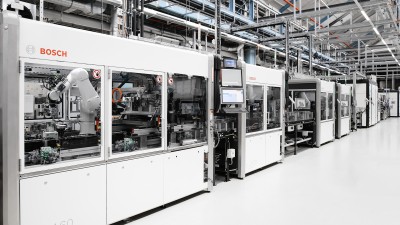BMG Pure Water System for electrolysis
Green hydrogen is a key technology for energy transition and decarbonization. Its production requires high-quality water and green electricity, both of which are readily available in remote areas such as offshore. With our BMG Pure Water Container, Bosch Manufacturing Solutions | BMG has developed a technology that converts seawater into ultra-pure water without the need for chemical additives. This energy-efficient, environmentally friendly, and emission-free solution is essential for optimizing electrolyzer performance and supporting sustainable green hydrogen production. Our advanced water treatment and water purification technology ensures a reliable, sustainable source of ultra-pure water for green hydrogen production.
Water Purification System for Electrolysis: Efficient, Sustainable, and Chemical-Free Water Treatment for Electrolysis and Green Hydrogen Production
While traditional technologies exist for electrolysis and water treatment, renewable energy applications pose unique challenges. Reverse osmosis, commonly used in industrialized regions, struggles with reliability in remote areas where energy supply fluctuates. Reverse osmosis requires high pressure to remove impurities, and chemical additives to extend membrane life, which end up in wastewater, so-called "brine". This results in emissions and high maintenance, complicating electrolysis projects. In contrast, the BMG Pure Water System leverages an innovative liquid-to-gas phase transition, offering a chemical-free, low-maintenance, and sustainable approach to water treatment, ideal for efficient green hydrogen production in remote areas.

Benefits at a glance
Sustainability
No chemical additives, ensuring zero emissions, environmental compliance, and maximum sustainability.
Reliability
Robust, long-term use with minimal maintenance. Predictive diagnostics reduce unplanned downtimes and keep hydrogen production running smoothly.
Energy-Efficiency
Dynamic operation with fluctuating green energy sources, ensuring low energy consumption and high efficiency.
Scalability
Modular design supports large-scale electrolysis (10+ MW).
Current projects: NorthH2 - Offshore Hydrogen Production
In a significant step towards sustainable energy, an agreement has been signed for the development of a 10MW offshore electrolysis demonstrator at the Alpha Ventus wind farm in the German North Sea. The project, part of the NORTHSEA HYDROGEN initiative by NorthH2, Deutsche Offshore-Testfeld- und Infrastruktur-GmbH & Co. KG (DOTI) and the Offshore Wind Energy Foundation, aims to demonstrate the feasibility and efficiency of green hydrogen production directly at sea. The goal of this project is to produce up to 70,000 tons of green hydrogen annually at an industrial scale, focusing on redundancy, security, and local production.













